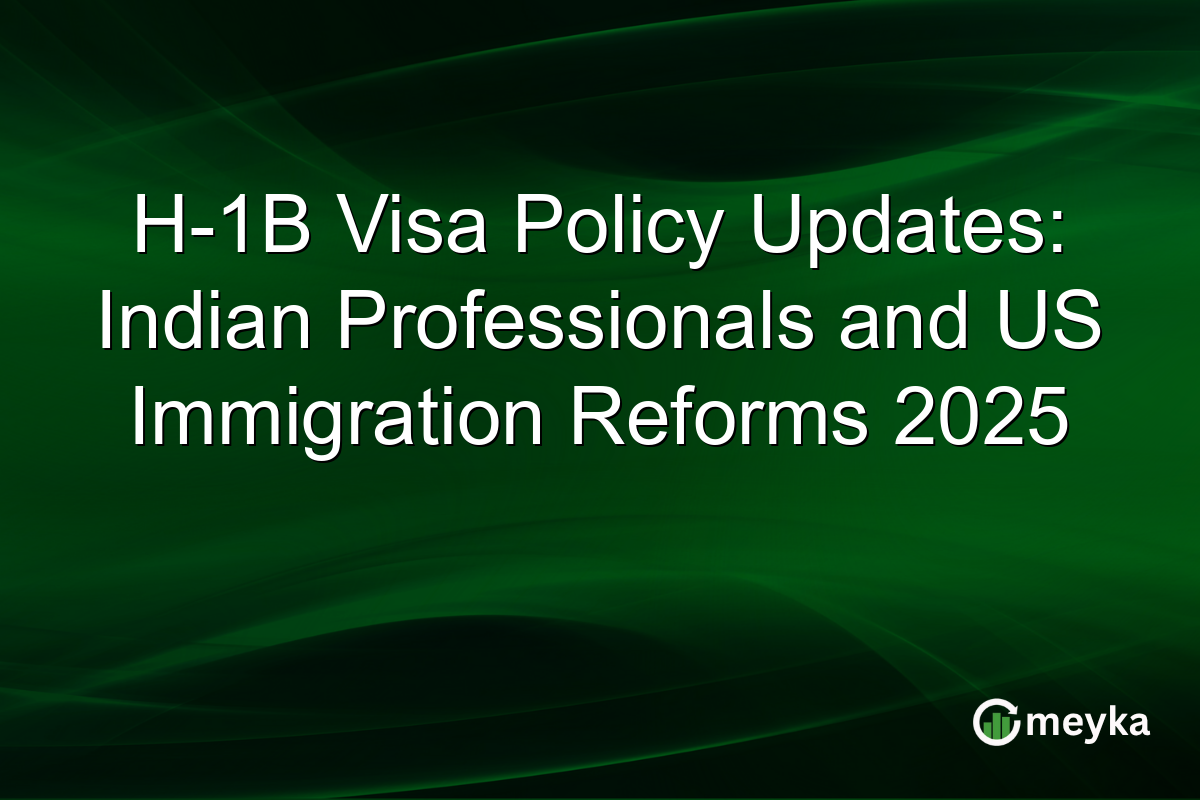H-1B Visa Policy Updates: Indian Professionals and US Immigration Reforms 2025
The H-1B visa system is pivotal for thousands of Indian skilled workers in the US, especially those in the tech industry. Recently, the Biden administration announced upcoming changes to the H-1B visa policy, emphasizing its impact on Indian professionals. These reforms are part of broader US immigration reforms in 2025, aiming to enhance labor market flexibility and address long-standing green card backlogs. With these updates set to reshape the workforce dynamics, it’s crucial for stakeholders to understand the potential outcomes.
Understanding the H-1B Visa Changes
The proposed changes by the Biden administration aim to streamline the H-1B visa process, addressing both efficiency and transparency. The modifications focus on optimizing allocation and reducing settlement times, which have become significant challenges for Indian skilled workers in the US. Analysts note that these reforms could simplify procedures for obtaining work permits and alter qualification criteria. This development is particularly relevant for the tech industry, which relies heavily on international talent. As discussions unfold, tech companies express cautious optimism, seeking clarity on how these changes will impact recruitment and project timelines. For instance, a recent CNBC article highlights industry concerns about maintaining access to global expertise amidst these shifts (CNBC). These updates signify a strategic move to balance domestic priorities with global talent demands, aiming for a more robust economic collaboration.
Impact on Indian Skilled Workers
For Indian professionals in the US, the policy updates could bring relief or further complications. Indian workers form a substantial part of the H-1B visa holders, often facing long waiting periods for permanent residency. The new rules aim to expedite this process, easing the path to citizenship. However, changes to application criteria might also tighten eligibility, causing unease among current and prospective visa holders. This uncertainty affects both individual careers and larger family planning decisions for many Indian expats in the US. According to a piece from Yahoo Finance, the emphasis is on reducing bureaucratic delays, which have historically hindered productivity and innovation. As the largest group of H-1B recipients, Indian workers are keenly watching the implementation of these reforms (Yahoo Finance).
Tech Industry’s Response to H-1B Policy Updates
The US tech industry is one of the biggest beneficiaries and stakeholders of the H-1B visa program. As reforms are rolled out, companies are evaluating the potential impact on their workforce structures. With many tech firms relying on Indian talent for critical roles, these changes could influence hiring strategies and project costs. The industry’s response is mixed—while some tech giants support the streamlined process, smaller startups worry about stricter applicant evaluations affecting their talent pool access. The evolving landscape requires companies to adapt quickly, ensuring they remain competitive in a global market. The reactions underscore the importance of flexible immigration policies in maintaining the industry’s innovative edge. Reuters reports a cautious yet hopeful sentiment from tech leaders, emphasizing the need for sustainable solutions (Reuters).
Final Thoughts
The recent H-1B visa policy updates represent a significant shift in US immigration strategy, directly impacting Indian professionals and the tech industry at large. While some changes promise improved processing and reduced backlogs, others could pose new challenges for eligibility. For Indian skilled workers, the implications are profound, potentially affecting career paths and family dynamics. Tech companies are urged to monitor developments closely, preparing for adjustments in hiring practices and workforce management. Overall, these reforms highlight a critical juncture in balancing domestic workforce needs with international talent competition, paving the way for a more integrated and efficient immigration process. Continued vigilance and engagement with policymakers will be essential in navigating these changes effectively.
FAQs
The H-1B visa updates aim to streamline the process by reducing settlement times and optimizing allocation. While these changes address green card backlogs, they may also introduce stricter eligibility criteria, impacting Indian professionals significantly.
Indian workers may benefit from faster processing times and smoother paths to citizenship. However, tighter eligibility criteria could create uncertainty, affecting both careers and family decisions for many expats.
Tech companies are cautiously optimistic, appreciating streamlined processes but wary of potential restrictions. Larger firms may adjust hiring strategies, while smaller companies express concern over access to global talent pools.
Disclaimer:
This is for information only, not financial advice. Always do your research.






